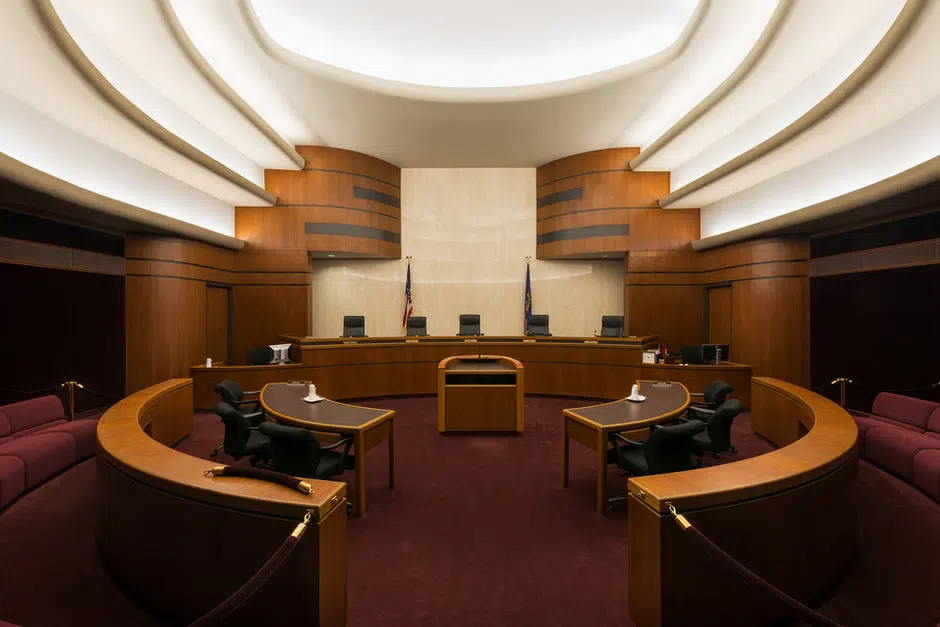
By: Mary Steurer
BISMARCK, N.D. (North Dakota Monitor) – The state of North Dakota on Tuesday asked the North Dakota Supreme Court to overturn a district court’s ruling that struck down a 2023 abortion ban, arguing that the state constitution does not give women the right to seek elective abortions.
“Nothing in our history suggests our constitution has ever been understood to guarantee abortions unrelated to the mother’s life or health,” North Dakota Solicitor General Philip Axt said in oral arguments before the court.
Daniel Narum appeared on the bench in place of Justice Douglas Bahr, who recused from the case.
The ban, signed into law by then-Gov. Doug Burgum in April 2023, outlawed abortion in all cases except rape or incest in the first six weeks of pregnancy, or when the pregnancy poses a serious physical health threat. Psychological conditions did not count as serious health risks under the law.
A group of reproductive health care doctors and an abortion clinic filed suit over the ban in 2023, arguing it violates individual rights and presents a due process concern to doctors by not making it clear when an abortion may be performed for health reasons.
South Central Judicial District Court Judge Bruce Romanick struck down the ban in September 2024, declaring it unconstitutionally vague and an infringement on medical freedom.
Romanick further found that “pregnant women in North Dakota have a fundamental right to choose abortion before viability exists.”
Romanick’s decision established broader abortion protections than previously recognized by the North Dakota Supreme Court in 2023, when it struck down a previous abortion law and ruled that North Dakota women have a right to obtain abortions for health reasons.
The state of North Dakota quickly appealed Romanick’s decision, asking the high court to rule that Romanick had overstepped and that the law is not unconstitutionally vague.
Axt argued Tuesday that the justices have previously found that the state has an interest in preserving unborn life, so the Legislature may pass laws that restrict fundamental rights in service of this interest. He said the 2023 law is narrowly tailored to this end.
Axt also said it would be atypical for the Supreme Court to strike down an entire statute on the basis of vagueness. He said that the court should at least keep the law in effect in situations where its application is clear-cut. If a patient is seeking an abortion but does not have any medical problems, for example, they would obviously not qualify for the health exemption, Axt reasoned.
If the court has concerns about whether an abortion would be legal in specific circumstances not addressed in the ban, it could issue an order carving out additional exemptions, he said.
Some justices expressed reservations about Axt’s proposal, questioning whether he was asking them to legislate from the bench.
“Isn’t it just as much of an infringement of the Legislature’s authority to strike down the law as it is to add an exception to it?” Justice Jerod Tufte asked.
Axt said that it would be less of an infringement for the court to invalidate part of the law than to declare the whole statute void.
“I’m not understanding how it’s infringing on the legislative process for us to describe what the constitution’s bounds are, and whether a particular statute falls within those bounds,” Justice Daniel Crothers said to Axt.
Representing the plaintiffs, attorney Meetra Mehdizadeh asked the high court to uphold Romanick’s decision. She argued that the North Dakota Legislature passed the 2023 law knowing it would raise constitutional questions.
“Legislators passed the amended abortion ban to, in the words of one legislator who disagreed with this Court’s decision, send a ‘message to the North Dakota Supreme Court,’” Mehdizadeh said, referencing remarks reportedly made by House Majority Leader Mike Lefor in 2023.
She said laws that affect fundamental rights require a high degree of specificity so that citizens understand how to follow them. The abortion ban doesn’t meet this standard, Mehdizadeh said.
She added that evidence filed in the case shows that there is not a consensus among doctors about when the health care exemption should apply.
“Doctors shouldn’t have to face felony charges and risk jail time just to learn what the law allows them to do,” she said. “It’s the Legislature’s job to tell them what the law allows them to do.”
Axt said that in order to convict a doctor for providing an illegal abortion under the 2023 law, a prosecutor would have to prove beyond a reasonable doubt that no doctor in good judgment would have also performed the procedure.
“Either doctors are capable of understanding the standard or they’re not,” he said.
The attorneys also briefly discussed the law’s exemption for sex crimes.
Mehdizadeh said the provision unreasonably requires doctors to make legal conclusions about whether their patient has been a victim of rape or incest.
Axt countered that a doctor wouldn’t need to “prove with a legal certainty that the crime occurred” in order to provide an abortion under the provision.
“So the patient simply claims they are pregnant as the result of one of the qualifying offenses — is that sufficient for a doctor to rely on the patient’s fair assertion?” Tufte asked him.
Axt said it’s not uncommon for doctors to take their patients’ words at face value when deciding whether to provide a treatment.
“I think if there would be a basis for a doctor to give credence to their statement and why they need treatment, then it would be a reasonable basis,” he said.
In a January majority opinion authored by Crothers, justices expressed skepticism about many of the state’s arguments defending the law. Justice Lisa Fair McEvers and Narum joined Crothers in the majority opinion. Chief Justice Jon Jensen and Tufte dissented.
North Dakota sets a high bar for declaring laws unconstitutional, requiring the vote of four of five Supreme Court justices. The Supreme Court did not indicate when it planned to issue a ruling.
The North Dakota Legislature is considering passing a law that, among other things, would require any doctor who can perform an abortion to watch a state-funded video explaining the abortion law, The Forum of Fargo-Moorhead reported. The bill sets aside $50,000 for the video, which would have to go to the North Dakota attorney general for final approval.
House Bill 1511 was passed by the House in February and will soon go to the Senate floor for a vote. Opponents of the bill have expressed doubts that doctors would find the video useful and said it would pose an additional administrative hurdle to them providing care.




Comments